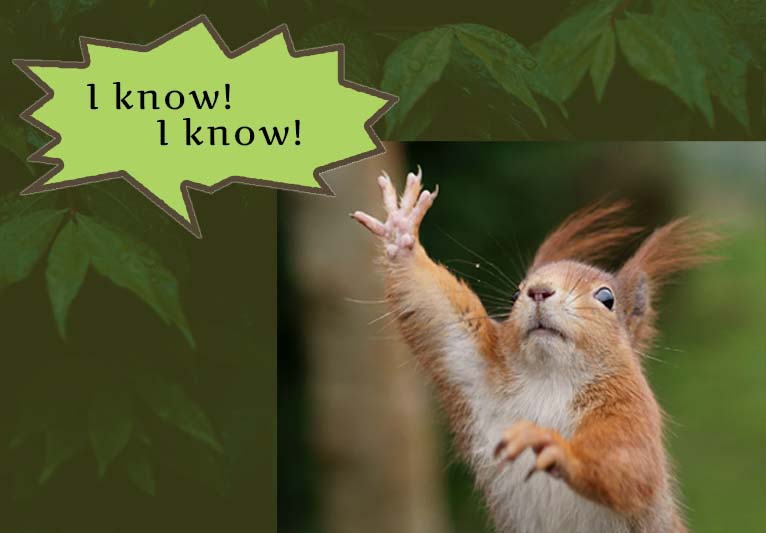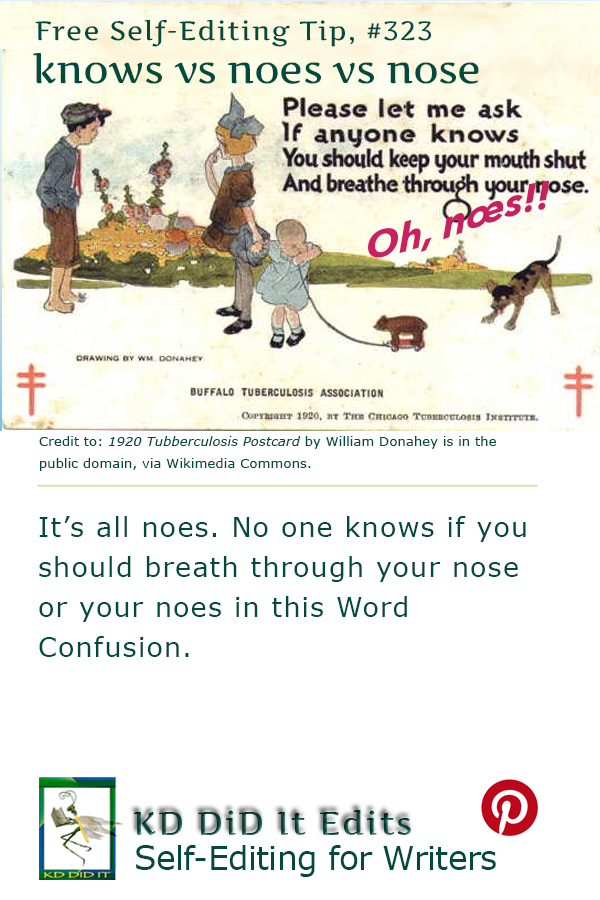Revised as of
7 July 2023
This one, er, three, was simply fun! It’s the nose that knows how to spout those noes in this heterograph!
Okay, so I’ll never make it as a comic . . . LOL . . . What’s truly embarrassing is how often I have come across a word confusion between knows and nose. Ya’d think it was pretty obvious, in fact, it’s as plain as the nose on your face!
Somehow, know has a number of conflicts within homonyms, and you may want to explore other posts that include know or no, including Know versus No, Know How versus Knowhow, and Knew versus New.
Word Confusions . . .
. . . started as my way of dealing with a professional frustration with properly spelled words that were out of context in manuscripts I was editing as well as books I was reviewing. It evolved into a sharing of information with y’all. I’m hoping you’ll share with us words that have been a bête noire for you from either end.
If you found this post on “Knows vs Noes vs Nose” interesting, consider subscribing to KD Did It, if you’d like to track this post for future updates.
| Knows | Noes | Nose |
|---|---|---|

I Know This One! by Peter Trimming is under the CC BY 2.0 license, via Wikimedia Commons. — Too funny . . . |

Lolcat: Too Many Admins by Luis Miguel Bugallo Sánchez with text added by EVula is under the CC BY 2.0 license, via Wikimedia Commons. |

A Close-up of Fort Ross Elena’s Nose by Franco Folini is under the CC BY-SA 2.0 license, via Wikimedia Commons. |
| Part of Grammar: | ||
| Verb 1, intransitive & transitive 2
Third person present verb: knows |
Morpheme: no
Plural for the noun: noes, nos |
Noun; Verb, intransitive & transitive Plural for the noun: noses Third person present verb: noses |
| Verb, intransitive: [With clause] Be aware of through observation, inquiry, or information 1
Verb, transitive:
Have developed a relationship with (someone) through meeting and spending time with them
[Archaic] Have sexual intercourse with (someone) 2 |
Negative answer or decision
Multiple utterances of the word no Denial or refusal A negative vote or voter |
Noun: Part of the body projecting above the mouth, containing the nostrils and used for breathing and smelling
Front end of aircraft, car, or other vehicle
Projecting part of something [Singular noun] A look, especially out of curiosity
The organ of smell The sense of smell Anything regarded as resembling the nose of a person or animal, such as a spout or nozzle The prow of a ship [Golf] The forward edge of the head of a golf club Verb, intransitive: Investigate or pry into something A vehicle or its driver makes one’s way way cautiously forward
Verb, transitive: Detect by diligent searching To touch or rub with the nose
|
| Examples: | ||
| Verb, intransitive: He knows! He knows of one local who shot himself. She knows not to go home yet. Verb, transitive: She knows they knew each other biblically. She knows what she’s doing. Paul would write to him if he knew his address. Janie knows it was something I wanted to do. He knows it! Jason knows and respects Laura. Isabel couldn’t hear the words clearly, but she knows the voice. There’s a little restaurant she knows about near Times Square. Charles was a man who had known better times. He knows how to paint with oils. The doctor was universally known as “Hubert”. Even though Tiffany is blind, she knows where Alex is anywhere in the room. He knows her. |
The noes have it.
The Conservatives wouldn’t have changed the noes to yeses for anything. In response, the noes were shouted from everywhere. They responded with definite noes. The answer was one of noes all around. The noes were ringing throughout the room. |
Noun: That dog has a keen nose. He has a nose for news. Check out the nose of the plane. He has a nose for a good script. He’s a renowned nose. He won by a nose! He hit the nose of the saddle with a loud oof. The wine is pungently smoky and peppery on the nose. She wanted a good nose around the house. Verb, intransitive: She’s always nosing into someone’s business. I was anxious to get inside and nose around her house. He turned left and nosed into an empty parking space. They nosed ahead by one point. Verb, transitive: It was a cheese that could be nosed out from some distance away. The dog nosed its pup back into the yard. The boat nosed its way toward shore. |
| Derivatives: | ||
| Adjective: knowable Adverb: knowingly Noun: ken, knower, knowing Verb: ken Verb, modal: can |
Adjective: noseless, noselike, unnosed | |
| Phrasal Verb | ||
| nose out | ||
| History of the Word: | ||
|
Old English nō is from ne (not) + ō or ā (ever). | Old English nosu is related to the Dutch neus and more remotely to the German Nase, the Latin nasus, and the Sanskrit nāsā. |
C’mon, get it out of your system, bitch, whine, moan . . . which words are your pet peeves? Also, please note that I try to be as accurate as I can, but mistakes happen or I miss something. Email me if you find errors, so I can fix them . . . and we’ll all benefit!
Satisfy your curiosity about other Word Confusions on its homepage or more generally explore the index of self-editing posts. You may also want to explore Book Layout & Formatting Ideas, Formatting Tips, Grammar Explanations, Linguistics, Publishing Tips, the Properly Punctuated, Writing Ideas and Resources, and Working Your Website.
Resources for Knows vs Noes vs Nose
Apple Dictionary.com
Dictionary.com: nose
The Free Dictionary: know
Pinterest Photo Credits:
1920 Tubberculosis Postcard by William Donahey <http://www.thetws.com/donahey.htm> is in the public domain, via Wikimedia Commons. The text on the upper right was moved down, and the background on top was extended.


